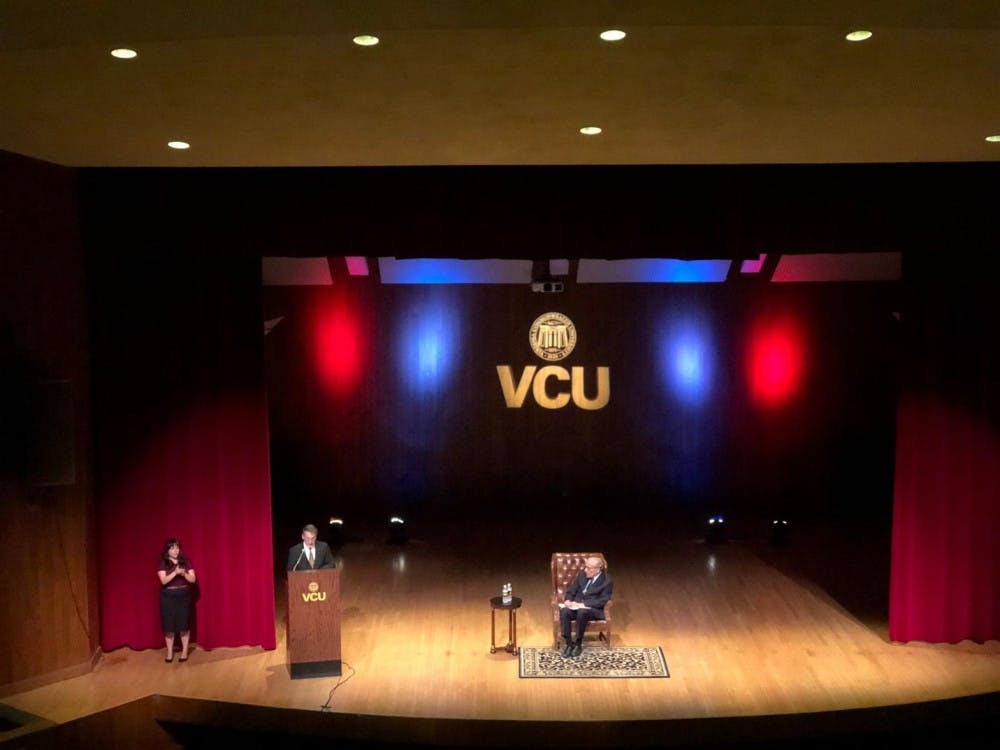Pulitzer Prize-winning journalist Bob Woodward said there was a war on truth during a talk about his new book, “Fear: Trump in the White House,” at Virginia Commonwealth University Tuesday night.
“Truth is the foundation of how we have our debates and people make their decisions,” Woodward, associate editor of The Washington Post, said. “You have to deal with truth.”
This comment struck first year student Lucia Sweeney, who attended the event.
“I think people forget that,” Sweeney said. “They get too involved with assumptions and arguments and polarization than actually going back to the truth.”
Truth has been a pillar of Woodward’s journalism career, especially in his famous Watergate scandal coverage.
In 1973, following the 1972 reporting of the scandal, Woodward had lunch with Katharine Graham, former publisher of The Washington Post, to discuss the coverage. Woodward retold the interaction at VCU Tuesday night.
“When’s all of the truth going to come out?” Graham said.
“Never,” Woodward responded.
Graham had a pained, wounded look on her face, Woodward said, the look you never wanted to see on your boss’ face.
“Never?” Graham said. “Don’t tell me never.”
From that moment, Woodward let these words inspire his journalistic work, he said.
“What she said was not a threat,” Woodward said, “but a statement of purpose.”
Enjoy what you're reading?
Signup for our newsletter
Truth requires uncovering, and Woodward discussed reporting methods while again reflecting on the Watergate era.
He said he was not going to get the answers directly from the White House. He had to go visit people at their homes to get the truth, often on background, a reporting methodology for which he is renowned in journalism.
“We need more background,” Woodward said. “Deep background stories. We’re not doing that.”
Woodward recalled a time when he showed up at a source’s home to interview with moments’ notice.
“You have to learn to shut up and let the silence suck out the truth,” Woodward said. “[The source] answered most of the questions because I showed up.”
Journalism student and sophomore Caroline Robelen listened to Woodward’s advice.
“As journalists we should take this as a challenge to do better, be careful,” Robelen said. “If people aren’t satisfied with what we as journalists are producing, it’s on us to improve the content.”
The Collegian asked Woodward how to balance protecting oneself as a journalist while also producing hard-hitting, strong journalism.
“What you have to do is be patient,” Woodward said. “But not too patient. You can’t wait. It’s kind of an instinct.”
While reporting on the Trump administration in his new book, Woodward focuses on the lawyering that Trump's administration has required and how it affects the truth.
Woodward said that when John Dowd, Trump’s former lawyer, hosted a mock Mueller interview for Trump, Dowd concluded that Trump was incapable of testifying, incapable of controlling emotions and telling the truth.
“We better wake up to what’s going on in the White House,” Woodward said. “God help us if we have a crisis.”
Woodward said the self-validation a person gets when elected president was something that none of us in our lives get. Destiny plays a big part in that, and the whole status of being unique and the power of the president are absolutely staggering, Woodward said.
“One of the common diseases, Republican or Democrat, is the disease of isolation,” Woodward said. “The treacherous curtain of deference falls down, and presidents do not get the truth.”
Although journalists are tasked with truth-telling, the business of the media needs a lot of examination, Woodward said.
Graham warned Woodward and fellow Watergate reporter Carl Bernstein of the “demon Pomposity” in a letter she sent them in the early 1970s. This self-satisfaction and smugness is a part of every industry, Woodward said, and it is present in journalism because of the new media landscape.
Woodward said so much in journalism was done by social media and the internet, and was driven by impatience and speed, or the “give it to me quickly” mentality.
When speaking with a Republican senator, Woodward had admitted that he had become worried about the media industry, he said.
“Everyone knows that the news media is just another form of politics,” the unnamed senator said, according to Woodward.
Woodward said there was unfortunately too much truth in that.
However, Woodward shared advice for aspiring young journalists about how he chooses to hire someone.
“I like to hire someone who’s been right a lot,” Woodward said. “I like someone who knows how to listen. I like to hire someone who has failed and they’re still standing.”
Journalism minor and senior Rebecca Rohn said seeing Woodward was a once-in-a-lifetime opportunity.
“My dad actually saw him when he was in college right after Watergate and was like 'You have to go,'” Rohn said.
Woodward’s visit to VCU was part of the fall 2018 speaker series of the Humanities Research Center in the College of Humanities and Sciences at VCU, co-sponsored by VCU’s Office of the President and the Richard T. Robertson School of Media and Culture.
Woodward’s latest book debuted on Sept. 11 and has sold over one million copies, according to Publishers Weekly.
Contact managing editor Sydney Lake at sydney.lake@richmond.edu.
Support independent student media
You can make a tax-deductible donation by clicking the button below, which takes you to our secure PayPal account. The page is set up to receive contributions in whatever amount you designate. We look forward to using the money we raise to further our mission of providing honest and accurate information to students, faculty, staff, alumni and others in the general public.
Donate Now



